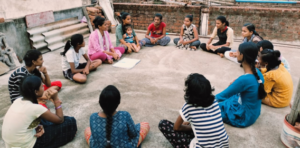Empowering Adolescents in the Slums: A Step Towards Better Health
In the bustling slums of Sikharchandi, access to health services remains a challenge, leaving adolescent girls particularly vulnerable. These girls face issues ranging from menstrual hygiene to reproductive health complications, often lacking essential knowledge and care. However, the dedicated efforts of CYSD, with the support of WIPRO Cares, are driving transformative change in these communities.
One such initiative was held on a warm afternoon, where a monthly adolescent meeting was facilitated by Liza Gouda, a 20-year-old community health worker (paramedic) trained to deliver healthcare and primary health counselling at the grassroots level. In attendance were girls like Sirisa Rao (17) and G. Sitalu Reddy (16), both suffering from anaemia, as well as Sibani Gouda (13) and Chandini Nayak (16), who had been experiencing white discharge—an often-ignored reproductive health problem.
 Anaemia is a prevalent concern among adolescent girls. Odisha government initia tives like the Mukhymantri Sampoorna Pushti Yojana (MSPY) and the Khushi program provide essential iron-folic acid supplements and free sanitary pads. Many girls in slum areas, however, were previously unaware of these schemes. However, with the support of health workers, girls like Sirisa and Sitalu have successfully accessed these benefits, along with dietary advice to incorporate nutrient-rich foods such as green leafy vegetables, eggs, and fruits into their diets. Another key government scheme is the Advika initiative, aimed at reducing vulnerabilities faced by adolescent girls. Kishori Kalendar, a key component of Advika, educates girls on important subjects including nutrition, anaemia, and reproductive health.
Anaemia is a prevalent concern among adolescent girls. Odisha government initia tives like the Mukhymantri Sampoorna Pushti Yojana (MSPY) and the Khushi program provide essential iron-folic acid supplements and free sanitary pads. Many girls in slum areas, however, were previously unaware of these schemes. However, with the support of health workers, girls like Sirisa and Sitalu have successfully accessed these benefits, along with dietary advice to incorporate nutrient-rich foods such as green leafy vegetables, eggs, and fruits into their diets. Another key government scheme is the Advika initiative, aimed at reducing vulnerabilities faced by adolescent girls. Kishori Kalendar, a key component of Advika, educates girls on important subjects including nutrition, anaemia, and reproductive health.
Menstruation is often viewed as a taboo subject in Odisha, resulting in many girls using unhygienic alternatives like old clothes instead of sanitary pads, which increases the risk of infections. Liza noted, “Initially, many girls were hesitant to discuss their menstrual issues with doctors; they were too shy to even bring them up. However, because I belong to their community, they feel more at ease talking to me. One significant change I’ve observed is their menstrual hygiene practices. At first, they didn’t know how to use sanitary pads properly, but now many have transitioned to using pads.”
The paramedics extend their efforts beyond group sessions, making regular house calls to ensure all adolescent girls participate in these vital meetings. By collaborating with Anganwadi workers, ASHA, and ANM, the healthcare team ensures that essential health services reach these girls’ doorsteps. Additionally, during Urban Health and Nutrition Days (UHND), which occur at least once a month, paramedics and ANM workers measure the girls’ haemoglobin levels and monitor their weight at Anganwadi centres, crucial for maintaining their health.
For girls like Sibani and Chandini, who had silently suffered from reproductive health issues, these meetings and home visits proved life-changing. With proper counselling and medical attention, they overcame stigma and sought help. As the meeting concluded, Liza encouraged the girls to follow the nutritional advice and stay connected with health workers for regular check-ups. “Change doesn’t happen overnight,” she stated, “but each month, we’re seeing more girls take control of their health and wellbeing.” CYSD’s initiatives illustrate how grassroots interventions can significantly impact the health and empowerment of adolescent girls. In the slums of Sikharchandi, where hope was once scarce, the path to empowerment is now becoming a reality.
Ananya Ipsita Misra
